
Samsung SSD 950 PRO Review (256GB & 512GB)
Manufacturer: SamsungUK price (as reviewed): 256GB: £146.86 (inc VAT); 512GB: £270.46 (inc VAT)
US price (as reviewed): 256GB: $199.99 (ex Tax); 512GB: $349.99 (ex Tax)
We have now resolved the issue with our SSD test system that prevented us from obtaining results for Samsung's SSD 950 Pro in time for the official reviews embargo lift. As such, this article will clarify what the issue was, briefly discuss the specs and features of the new drives and then dive into the results. For greater detail on the drives themselves please see our original preview article.
The issue we had is worth drawing attention to since no faulty components were involved. We use an X99 motherboard for SSD testing, specifically the Asus Rampage V Extreme. However, when we originally tested the SSD 950 Pro drives both were being capped in performance. A later installation of a beta version of the Samsung Magician software revealed that the PCI-E link speed was being limited to 5Gbps, i.e. PCI-E Gen 2.0 instead of Gen 3.0, which the drives need to operate at full speed.
The problem turned out to be something as simple as our overclock settings. We use Corsair Vengeance LPX DDR4 modules rated at 2,800MHz, and we were using their built in XMP profile for our system's overclock. However, this automatically sets the base clock to 125MHz, which is a requirement when using high frequency memory (i.e. above 2,666MHz) on X99. However, this also affects the speed of other parts of the CPU, not just the cores, and one of those parts is the onboard PCI-E Gen 3.0 controller. In turn, in order to maintain PCI-E stability at this clock, our motherboard was downgrading the PCI-E interfaces to Gen 2.0. You can force the graphics slots back to Gen 3.0, but there's no such option for the M.2 slot, which makes sense since storage devices require perfect stability. We have not been able to confirm exactly how other motherboard manufacturers handle the situation, but it's probably safest to stick to 2,666MHz DDR4 on X99 when using a PCI-E 3.0 storage device. It should also not be a problem on Z170, where the PCI-E controller's clock is separate to the CPU BCLK.
| Samsung SSD 950 PRO Specs | 256GB | 512GB |
| Interface | M.2 PCI-E 3.0 x4 (up to 32Gbps) | |
| Formatted capacity | 238.47GiB | 476.94GiB |
| Controller | Samsung UBX | |
| NAND dies | 128Gbit Samsung 32-layer V-NAND MLC | |
| NAND packages | 2 x 128GiB | 2 x 256GiB |
| DRAM | 512MB Samsung LPDDR3 | |
| Warranty | Five years | |
| Endurance | 200 TBW (~110GB/day) | 400 TBW (~220GB/day) |
With that clarified, let's take a brief look at the SSD 950 Pro (again, for a more detailed look, see here). It comes in either 256GB or 512GB flavours, but only in the single-sided M.2 2280 form factor. They also use the PCI-E 3.0 x4 interface and the NVMe protocol. With Samsung's UBX controller and LPDDR3 cache, they're very similar to the NVMe version of the OEM SM951 SSD. However, they make a switch to Samsung's second generation V-NAND dies, specifically 128Gbit 32-layer MLC dies, though performance is still mostly the same as the SM951. A 1TB SSD 950 Pro is planned for next year once the third-generation, 48-layer V-NAND dies roll out.
What you do get over the SM951 is a better looking black PCB and extra features, including a proper Samsung-backed five year warranty with a solid endurance rating that's a third higher than the 850 Pro, albeit in a warranty period that's half as long – it's a shame Samsung hasn't retained the 10 year period for the 950 Pro. You also get full software support in the Samsung Magician software as well as hardware accelerated encryption with TCG Opal 2.0, to be enabled through a future firmware update.
| Samsung SSD 950 PRO | 256GB | 512GB |
| Max Sequential Read | 2,200MB/sec | 2,500MB/sec |
| Max Sequential Write | 900MB/sec | 1,500MB/sec |
| Max Random Read (4K QD1) | 11K IOPS | 12K IOPS |
| Max Random Write (4K QD1) | 43K IOPS | 43K IOPS |
| Max Random Read (4K QD32) | 270K IOPS | 300K IOPS |
| Max Random Write (4K QD32) | 85K IOPS | 110K IOPS |
The cost per formatted gigabyte of these drives is about 62p/GB (256GB) and 57p/GB (512GB), which is certainly high given that we now have SATA SSDs hitting less than 25p/GB, but they do combine many of the latest technologies and features into a consumer-friendly package with what looks to be very high performance. By the same basis, they're also considerably cheaper than the only other widely available consumer-grade NVMe drive, the Intel SSD 750 (around 70 to 80p per formatted GB).

MSI MPG Velox 100R Chassis Review
October 14 2021 | 15:04

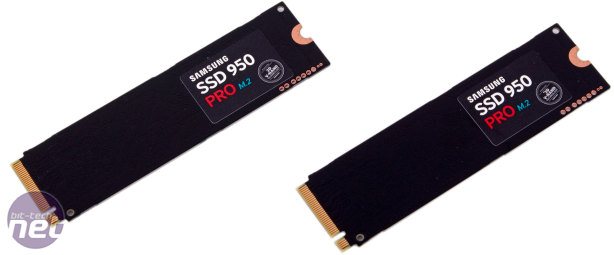
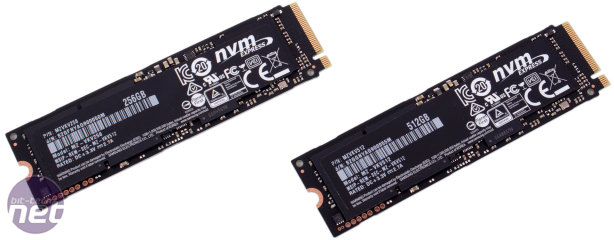
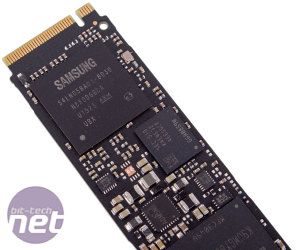
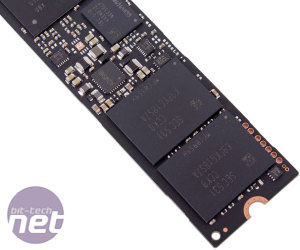
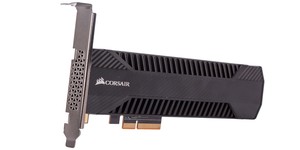






Want to comment? Please log in.